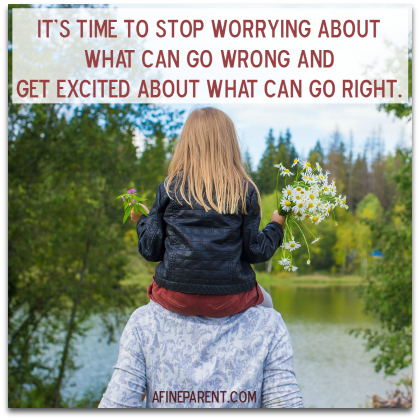 I long, in a romantic, nostalgic way, for the days of my childhood.
I long, in a romantic, nostalgic way, for the days of my childhood.
Running in open fields. Biking down the road with my friends. Building forts and dams down by the creek. Camping in the woods. With nary an adult in sight.
But that nostalgic longing isn’t about me. I am sad my kids can’t experience the wild freedom of my childhood.
And why can’t I give my kids have that same carefree childhood that I had?
Fear.
I fear for my children. For their safety. I fear that they will be kidnapped. Hit by a car. Harmed by doing something because they didn’t think through to their consequences. I fear the consequences will be more than I can bear.
Parenting isn’t for wimps. It is soul-wrenchingly awful to let your heart out of your body and go walking around where you have no control and can’t protect it.
Before I had even realized it, I had forgotten the carefree joys of my childhood. And had turned into a clichéd helicopter parent.
I would strive to shield them from all consequences. I would hold their hands tightly as we crossed any street. I would stop them just as they were about to jump off the playground equipment, a mere 2 feet in the air.
It takes a lot of guts and bravery to let our children go and live their lives. I used to think that moving across the country alone with 2 suitcases, no job, and $1000 was the bravest thing I ever did.
Nope. Now I realize that pales in comparison to parenting.
Parenting has been the scariest thing I’ve ever attempted. I think I was more terrified than my kids on their first day of pre-school. And that was only the start!
I couldn’t keep going down that path, though. Because soon I realized, as kids grow older, so do the number of things I could be scared of. Continuing down that path of fearful parenting would someday lead me to a nervous breakdown.
I chose to learn how to parent bravely. It hasn’t always been easy. And it’s a conscious effort. Here are 4 key things I learned along the way.
#1 You HAVE to Learn to Be Vulnerable
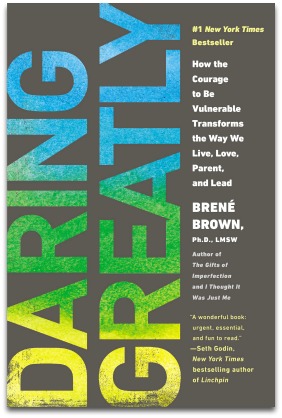 In her book Daring Greatly, Brene Brown confides that she only feels vulnerable when she is in a state of fear, when she is anxious or unsure of an outcome. Her therapist recommended more feeling and less thinking. To stop over-analyzing how we are living and just live.
In her book Daring Greatly, Brene Brown confides that she only feels vulnerable when she is in a state of fear, when she is anxious or unsure of an outcome. Her therapist recommended more feeling and less thinking. To stop over-analyzing how we are living and just live.
I am not comfortable with feeling vulnerable. Especially when it comes to my children. I suspect not many people are.
It’s horrifying. I must have control over them and our relationship (or feel like I have some control) in order to feel comfortable. Yet, I cannot have an honest connection with them if I try to exert so much control that the connection suffocates.
When I shape these connections to my own ideas of what I need, I miss out on fulfilling needs I am not consciously aware of!
And, by controlling how my children interact with the world I also miss the greatness they are actually capable of.
For years I was convinced that I needed to be there to translate the world for them. And then, we had to move to Switzerland, a country where I didn’t have any concept of the culture.
Talk about feeling vulnerable!
Because I couldn’t speak the language, I couldn’t translate how my own interactions with others would go, much less my boys’ interactions.
It was more than a bit terrifying.
But I had no choice.
I had to learn to feel vulnerable so I could make new friends, learn German and be able to feed my family.
And I learned along the way how strong my children are.
When I let go and moved outside of my comfort zone, I learned my children actually do know how to get to the park and back. They do know how to conduct themselves in public. I learned they can survive without me.
It was the most liberating feeling I’ve ever had.
I had no idea how much stress and pressure there was built up inside me. As soon as I allowed myself to be vulnerable and release some control I also released a huge amount of anxiety. I could feel it deflate like a balloon that had been pushed up against my ribs.
I floated with relief.
#2 You HAVE to Start Small
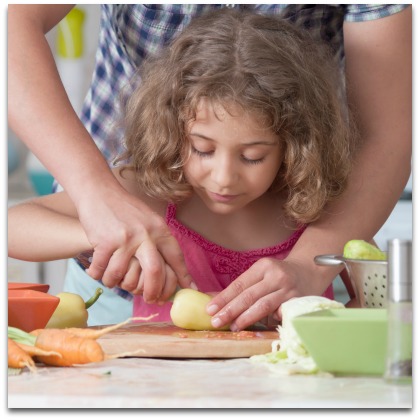 I didn’t just start off trying to parent bravely with letting my kids go off to the store by themselves. I started small. With little tasks and opportunities that I was already confident about.
I didn’t just start off trying to parent bravely with letting my kids go off to the store by themselves. I started small. With little tasks and opportunities that I was already confident about.
Things like running to the neighbor’s house and then back to drop something off. Getting them to help chop vegetables with an actual real-and-for-true sharp knife. Having them play in the yard with some friends from the neighborhood and leaving my windows open so I could hear them.
By starting small you can reaffirm what you are already good at and solidify your foundation of confidence. Then you can take steps, no matter how small, that will grow your confidence in other areas.
After I felt confident in my sons’ foundational abilities, I worked up to things that felt a little riskier. Like leaving my 9-year-old home alone for an hour while I ran his younger brother to violin lessons ten minutes away. Or like having them go 3 stops on the tram by themselves to where I could meet them. And going for a family bike ride on some of the more urban routes!
Finally, after about 9 months of slowly stretching the edges of my comfort zone and having my boys learn how to be safely independent, I made a leap.
I let them come home by themselves from school on the tram.
It was a 40-minute ride with their school friends to a transfer at the central station. Then another tram ride with a 4-block walk home. It was a ride they’d done 216 times with me over the school year. I was confident they knew the route.
It felt like forever. I wore a hole in the carpet with all the pacing I did at home. I made a cup of tea and feigned a leisurely attitude as I drank it on our balcony while searching for signs of them.
When they got home I had to reign in my anxiety though — they were bursting with pride.
They felt, and I finally believed, they were ready to conquer the world!
#3 You HAVE to Give Benefit of the Doubt a Chance
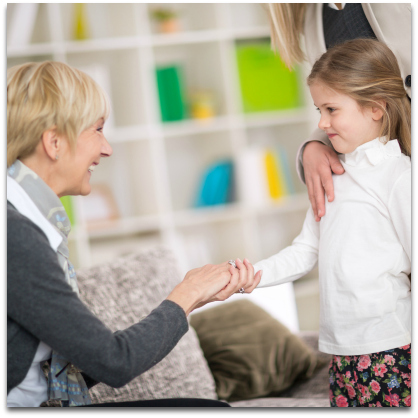 What ever happened to the benefit of the doubt? To trusting others? Our children? Our neighbors? Heck! To even trusting ourselves!
What ever happened to the benefit of the doubt? To trusting others? Our children? Our neighbors? Heck! To even trusting ourselves!
More importantly, how can we bring it back?
I started with how I viewed others. I tried to stop judging others on how they parent and how they live their lives.
I began approaching everyone with courtesy and grace, saying “thank you” and “you’re welcome” and “I’m sorry.” I tried helping those who are in need rather than be afraid of getting involved.
Benefit of the doubt is rooted in trust and belief. Believing that you have a responsibility to yourself and the society around you. And trusting that society will treat you and your family with a reciprocal, unconditional positive regard.
Unconditional positive regard is the belief that everyone around you is doing their best and to respect what decisions they make in living their lives. Carl Rogers, who developed the theory of unconditional positive regard, believed that the more people feel their life choices are respected, the more connected to society they feel.
We start to believe others know we are trying our best. We start to believe that they will help us along our paths. We start to see we share larger goals: a safe place to live; for our children to be happy and healthy; and to be happy and healthy ourselves.
When you feel connected to society, you start to give others the benefit of the doubt. And to have faith that should your kids need help when you are not around, there will be other grownups who will provide that help. Just as you would to some stranger’s child in need.
It’s a key piece to learning to parent bravely.
#4 You HAVE to Accept the Consequences as Theirs
A final step to parenting bravely is to let your children test themselves and then to allow them to fail.
As a parent nothing is harder than letting your child face the consequences of their actions. I think my stomach does more flips that Simone Biles when I step back and let my boys try to solve their own problems.
But stepping in to solve their problems and take on their consequences hinders their growth. When we protect them like this they don’t learn tenacity. They don’t learn how to pick themselves up after they fall. They don’t learn grit.
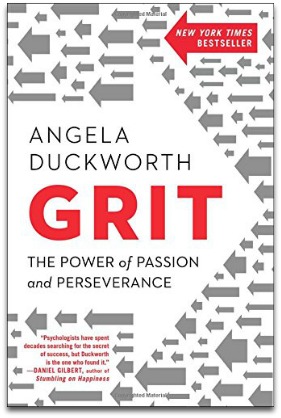 Angela Lee Duckworth, a psychologist, MacArthur Genius Grant winner, and bestselling author of Grit: The Power of Passion and Perseverance, has found that a child’s determination and grit is a better determiner of success than intelligence or natural talent.
Angela Lee Duckworth, a psychologist, MacArthur Genius Grant winner, and bestselling author of Grit: The Power of Passion and Perseverance, has found that a child’s determination and grit is a better determiner of success than intelligence or natural talent.
As painful as it is, our children need to not only fail, but also accept their part in the failure. If my boys can’t accept and understand their role in their failures, they won’t understand how to fix them. They won’t figure out how to do better next time.
My boys hate to accept the consequences of their actions. They would love nothing more than have no one notice that they are skirting their consequences.
But as parents we need to enforce those consequences. Especially the small ones. The small ones are easier to enforce, actually.
The smaller the consequences, the fewer emotions are involved on my side. I can much more easily enforce the cleaning of a broken cup or taking away iPad privileges if I’m not on the verge of losing my temper.
Not only that, but my boys can also take the consequences with more grace if I keep my emotions out of it.
As we take the emotions out of enforcing consequences, we can help them to analyze the outcomes using Appreciative Inquiry. We can teach them how to think ahead and how to make better choices the next time.
As they learn how to make better choices, it becomes easier for us give them more freedom.
And it becomes a tiny bit easier to parent bravely.
The 2-Minute Action Plan for Fine Parents
Take a few minutes today to sit down and think how you can parent more bravely.
- What freedoms and risks do you allow your child to take?
- What are 3 small risks just outside your comfort zone you can let your child take this week? Is it taking out the trash? Or using a real knife to help prep dinner?
- When was the last time you gave a stranger the benefit of the doubt?
- How often do you model grace and courtesy towards strangers? Saying thank you or please? Offering someone assistance? Or, simply smiling kindly at someone who seems to be having a rough day?
- What do your children do when they are facing consequences? How do you react? What happens between the two of you when you have to enforce consequences? Do things change when you try to keep your emotions in check?
The Ongoing Action Plan for Fine Parents
The long-term action plan this week is a journey into vulnerability and exploring the benefit of the doubt.
- How comfortable are you with vulnerability in your own life? Journal or just take time to think about how being vulnerable makes you feel. Think about one thing where you can let go of control and feel vulnerable this week. It can center around your children or another relationship or be in a completely different area. Focus on how you physically feel and the thoughts that come up as you allow yourself to feel vulnerable.
- Start mentally tracking your initial gut reactions to people you see on the street, on the subway, or in restaurants. Do you feel neutral? Or even joyful? Are you defensive? How can you give them the benefit of the doubt? If you are having trouble, try making up a story about them living a life similar to yours. How do you feel about them now?

Good post guys!
When you feel associated with society you begin to assume the best about others. Also, to have confidence that ought to your children require help when you are not around, there will be different adults who will give that offer assistance. Similarly as you would to some more peculiar’s tyke in need.
I’m sorry as much as there are several good points here, letting your kids walk to and from school or take public transportation is just not safe! People prey on children who are alone and when child sex trafficking is an epidemic this seems like poor to worrisome advice at the least! I would never be okay with that and never put my children in that position! Maybe in Switzerland it’s not as much of a concern…
I’ve heard arguments on both sides of this issue, Alice. And I’m on the fence about it. But that’s not quite the point…
What I took away from this article is that there will always be something that we will worry about… so instead of giving in to the fear, inspect the worry and find ways to deal with it bravely.
For instance, I am too scared to let my daughter (she is 8) walk to the corner store on her own. But I do want her to learn independence. So once in a while when we go to the store, I wait in the parking lot while she goes in on her own and buys what we need.
Is it the same as letting them walk to the store like we did when we were kids? No, it’s not. But I do think it teaches similar lessons important for them to eventually navigate the Real World on their own.
I think that’s one of the lessons of this article…
You had me at the word “tram.” Even in Switzerland where letting your kids be kids seems to be easier, it’s a good reminder to take a step back to let your kids be able to step forward on their own.
My best house rule is, “Don’t do anything that would upset your mother.” It covers all the bases. Kids pretty much know what they should/shouldn’t be doing, and you don’t have to worry about going into all of the details.
Love that rule, Maureen! Our variant is “If you don’t think you will be able to talk to me about it, it’s probably not a good idea” (She is 8, so this seems to be working at the moment).